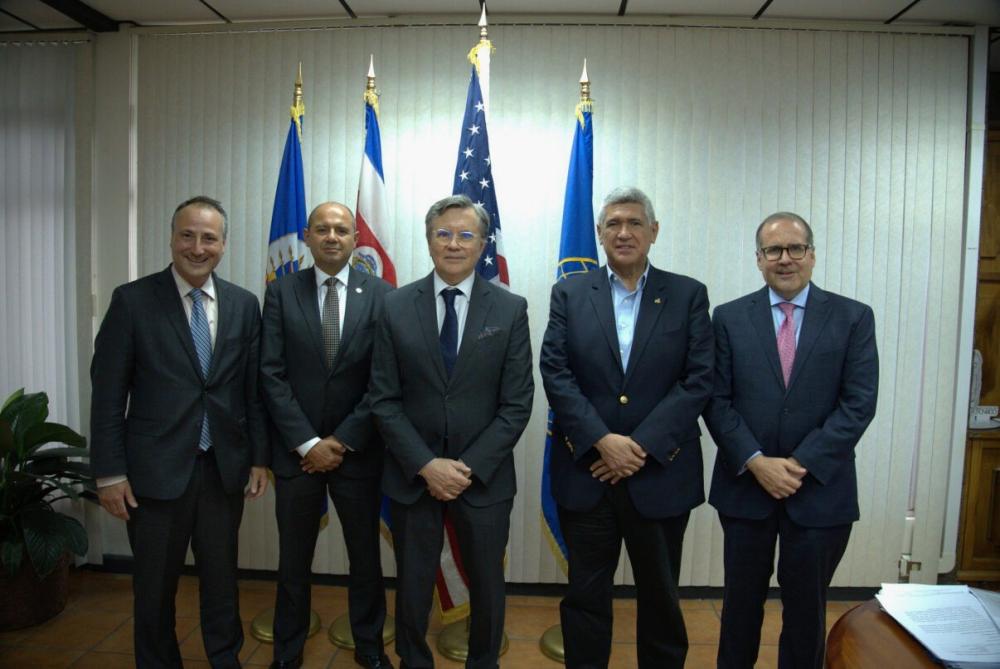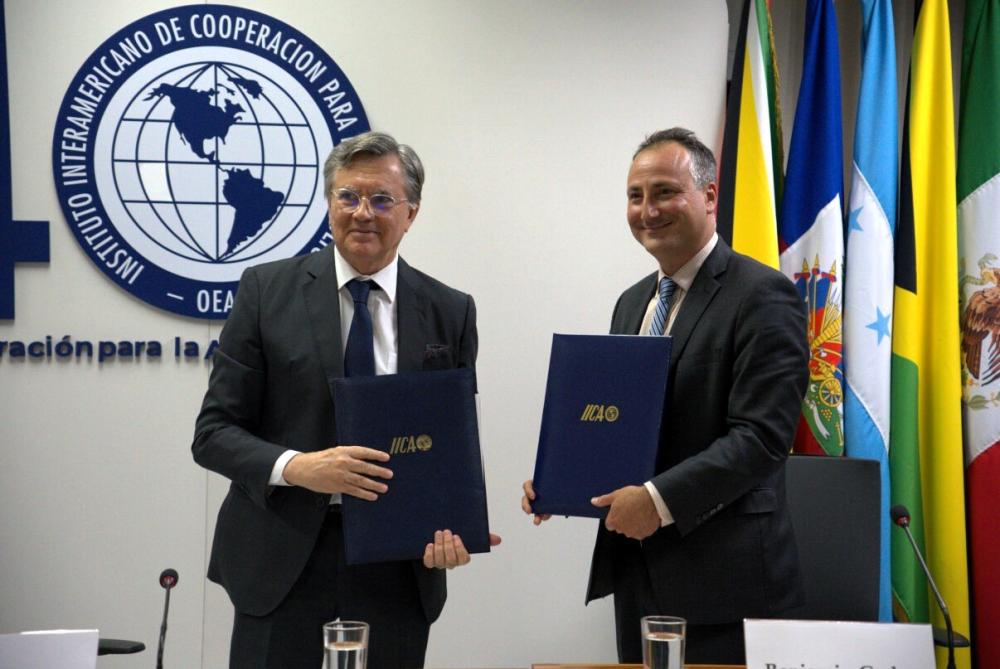Senior officials from the Wilson Center, Earth University and IICA advocate for better policies and more investment in science and innovation to strengthen agricultural sustainability and global food security

San José, 12 June 2024 (IICA). A new generation of long-term public policies, more investment in science and innovation, viable technological solutions for farmers that allow them to make changes in their production and apply good agricultural practices, and stronger links between the public and private sectors: all these elements are crucial in moving towards sustainable agriculture and strengthening global food security.
To address these common points of interest, the Director of the Latin American Program of the Wilson Center, Benjamin Gedan; the President of Earth University, Arturo Condo; and the Director General of the Inter-American Institute for Cooperation on Agriculture (IICA), Manuel Otero, engaged in a public dialogue entitled “Global food security and sustainable agriculture in Latin America.”
At the event, which took place at IICA Headquarters in San José, Costa Rica, the experts emphasized the key role of agriculture as a guarantor of global food security and environmental sustainability, and the challenges and opportunities facing the sector in the transformation process it is undergoing.
“Looking to 2050, agriculture faces two main challenges: the need to provide enough food, in other words, to produce 50-60 per cent more food while at the same time ensuring that it is nutritious, in order to address the serious problem of malnutrition,” said Otero, who added that the Americas are the guarantor of food security, given that one in every four tons of food sold in international markets comes from the continent, a trend that will intensify in the future.
“No other continent has enough land, natural resources, and 17 million small farmers as its mainstay. We have a bright future that depends on science and innovation, which have to be adapted to our producers, which is why we must invest more, create better links between the public and private sectors, and take advantage of the bioeconomy,” added the head of the inter-American organization specializing in agriculture and rural development.
Otero also emphasized the urgent need to launch a new generation of policies in order to realize the concept of sustainable and resilient agriculture. “It’s easy to say, but difficult to implement, because an intersectoral approach is required,” he explained.
Gedan, from the Wilson Center, stressed that it is essential to foster conversations among decision makers in the region to generate new legislation, agreements, and best practices that have a real impact on agriculture and the lives of rural dwellers. He also referred to the potential of the Americas to ensure the availability of affordable food across the globe.

“The continent has fertile land and possesses extraordinary resources, and the new agricultural technologies provide opportunities for increasing production in a sustainable way and mitigating the impact of climate change. We must generate more sustainable and reliable food supply chains. This calls for technical assistance, more investment and partnerships, and IICA is a key player at this time, which is why we are committed to addressing these challenges together,” he remarked.
Arturo Condo, President of EARTH University, emphasized that to further enhance sustainable agriculture and demonstrate its contributions to global, regional and national food security, it is essential to “change the way we produce, process, distribute and consume food, and for that to happen training, generational change on the land, new technologies, and the link between these solutions and producers are of key importance.”
“There are about 570 million small farms of five acres or less that produce about 45 per cent of the calories and a little more than 40 per cent of the economic value of food. It’s a question of providing nutritional products for consumers and fostering an entrepreneurial spirit and that’s part of our university’s goals,” Condo said.
The dialogue on world food security and sustainable agriculture took place within the framework of the signing of a cooperation agreement covering the next four years between IICA and the Wilson Center. Among other things, the agreement is designed to promote sustainable food production in Latin America, increase the region’s role in global food security and minimize environmental impacts. It will also foster actions to address the impacts of climate change on farmers in the region through the development and deployment of agricultural technologies, joint research and public dialogue.
The Deputy Minister of Foreign Affairs of Costa Rica, Alejandro Solano, was on hand for the signing ceremony and expressed his support for the partnership and the joint efforts, which are an excellent way of “promoting sustainable agriculture and contributing to the global, regional and national challenge of achieving food security, one of the biggest challenges facing our societies: to guarantee every person access to sufficient, safe food.
The Wilson Center is one of the Americas’ leading forums dedicated to independent research and dialogue on global issues. It was established in 1968 by the United States Congress in memory of President Woodrow Wilson. Its Advisory Board is made up of private sector leaders and former public officials from different countries in the Americas.
More information:
Institutional Communication Division.
comunicacion.institucional@iica.int